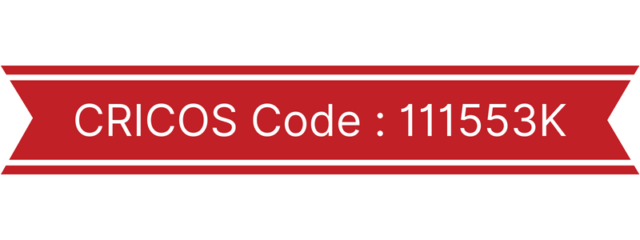CHC50121 – DIPLOMA OF EARLY CHILDHOOD EDUCATION AND CARE

In the CHC50121 – Diploma of Early Childhood Education and Care (111553K), you will develop cultural awareness and critical thinking skills necessary for analyzing and producing various types of communication in a wide range of careers. This qualification empowers you to make a positive impact in any field you choose.
- Course Duration: 104 weeks (84 weeks of study + 24 weeks of holidays)
- Campus Locations: Campbelltown, Kogarah, Parramatta, Burwood
COURSE DESCRIPTION
The CHC50121 – Diploma of Early Childhood Education and Care (111553K) is designed for educators working in regulated children’s education and care services in Australia. At this level, educators are responsible for designing and implementing curriculum that aligns with approved learning frameworks and ensuring compliance in all aspects of service operations. They apply specialized knowledge and theoretical concepts to diverse work situations and may supervise volunteers or other educators. Early childhood educators can work in long day care centers, family day care, pre-schools, or kindergartens.
To obtain this qualification, individuals must complete a minimum of 160 hours of work in a regulated children’s education and care service in Australia, as specified in the Assessment Requirements of the competency units. These hours can be distributed across multiple competency units that require workplace experience.
There are no specific licensing, certification, or legislative requirements associated with this qualification at the time of publication. The Australian Children’s Education and Care Quality Authority (ACECQA) publishes approved early childhood education and care qualifications and regulatory information on their website.
Duration
The course spans 104 weeks (80 weeks of study + 24 weeks of holidays), including 280 hours of practical placement in a regulated early childhood education and care facility.
Recognition

Start Date
Various intake and start dates are available. Call on +02 4608 9972 for more information
Study Mode
On Campus, face to face delivery and Practical Placement
Campus Location:
Campbelltown Campus: Level-6, Suite 6.01/138 Queen Street, Campbelltown, NSW 2560
Kogarah Campus: Suite 1/6 Derby St, Kogarah NSW 2217
Parramatta Campus: Suit 513A, Level 5, Westfeild parramatta 2150
Assessment Methods
Assessment methods may include: Knowledge questions, Projects, Written reports, Portfolio of work, Assignment, Case Study, Self-assessment, Observation and Role Play.
All assessments are conducted in accordance with the Principles of Assessment (fairness, flexibility, validity and reliability) and Rules of Evidence (validity, sufficiency, authenticity and currency).
What you will achieve
Upon completion of the CHC50121 – Diploma of Early Childhood Education and Care (111553K) qualification, you will gain the following abilities:
- Support children’s learning and development
- Design, plan, implement, and evaluate educational programs
- Support the health, learning, and development of children and their families
- Collaborate with community and external agencies
- Provide leadership and support to other staff members
- Manage various early childhood services
- Ensure compliance with policies and legislation
Pre-requisites
To enroll in this qualification, you must meet one of the following criteria:
- Hold a CHC30121 Certificate III in Early Childhood Education and Care or
- Hold a CHC30113 Certificate III in Early Childhood Education and Care.
RTO Requirements for International students
International students must fulfill certain English language requirements for admission into ASIA:
- Be at least 18 years old and have completed Year 12 or an equivalent qualification.
- Participate in a course entry interview to assess suitability and needs.
- Obtain an IELTS* score of 5.5 (results should be within 2 years). Other English language tests like PTE and TOEFL may also be accepted. The results should be equivalent to IELTS 5.5.
Additional information on student visa assessment levels can be found on the Department of Home Affairs (DHA) website.
Pre Training Preview(PTR)
All international learners must undergo a pre-training review to determine their training needs. The review includes questions about previous education or training, relevance of the course, and relevant experience. An interview conducted by the institute’s enrollment officer using the Astral pre-enrollment kit aims to assess course suitability, support needs, and potential Recognition of Prior Learning (RPL) opportunities. This review ensures that learners have the necessary skills to successfully complete the course.
Language, Literacy and Numeracy Test(LLN)
Candidates undertaking this course must possess adequate numeracy skills, as it involves calculations, reading anaphylaxis plans and medication labels, and interpreting the National Quality Framework and Standards. All learners are required to undertake a language, literacy, and numeracy (LLN) test mapped at ACSF level 4, conducted by the institute. If learners do not meet the English and LLN requirements, they may be required to undertake further language, literacy, and numeracy training and English Language Intensive Course for Overseas Students (ELICOS) programs at their own expense before enrolling in this course.
Credit Transfer
Credit transfer applications must be supported by appropriate documentation, such as nationally recognized qualification certificates, transcripts, or statements of attainment. The documentation should correspond with the qualification code, unit code, and course duration included in the student application.
Course Structure
| Unit code | Unit Title | Core/ Elective |
|---|---|---|
| CHCECE047 | Analyse information to inform children’s learning | Core |
| CHCECE048 | Plan and implement children’s education and care curriculum | Core |
| CHCECE043 | Nurture creativity in children | Core |
| CHCECE044 | Facilitate compliance in a children’s education and care service | Core |
| CHCECE049 | Embed environmental responsibility in service operations | Core |
| CHCECE053 | Respond to problems and complaints about the service | Elective |
| CHCECE045 | Foster positive and respectful interactions and behaviour in children | Core |
| CHCECE046 | Implement strategies for the inclusion of all children | Core |
| BSBTWK502 | Manage team effectiveness | Core |
| CHCECE041 | Maintain a safe and healthy environment for children | Core |
| CHCECE042 | Foster holistic early childhood learning, development and wellbeing | Core |
| CHCECE050 | Work in partnership with children’s families | Core |
| CHCPRP003 | Reflect on and improve own professional practice | Core |
| CHCDIV003 | Manage and promote diversity | Elective |
| CHCPOL002 | Develop and implement policy | Elective |
Possible Career Outcomes
Upon completing the CHC50121 – Diploma of Early Childhood Education and Care (111553K), learners will be prepared for senior-level positions and have the core skills and experience necessary to pursue various roles in the early childhood education and care sector, such as:
- Child Care Centre Manager / Director
- Family Day Care Provider
- Early Childhood Team Leader
- Family Day Care Coordinator
- Playgroup Coordinator
- Early Childhood Educator
- Assistant Director in an Early Learning Centre
- Preschool Assistant
- Nanny
Note: The career pathway information provided is based on the qualification description on the National Training Register and market research. It does not guarantee employment or specific job roles upon course completion. The institute does not claim any employment outcomes or job guarantees associated with its courses.
Pathways from this qualification
After successfully completing the program, participants are eligible to enroll in CHC62015 – Advanced Diploma of Community Sector Management and/or other related diploma qualifications.
[NB. ASIA does NOT offer CHC62015 – Advanced Diploma of Community Sector Management.]
The CHC50121 – Diploma of Early Childhood Education and Care (111553K) qualification can also serve as a foundation for further tertiary study and support career progression. Upon achieving this qualification, candidates may apply for the following:
- Bachelor of Early Years Education
- Bachelor of Early Years and Primary Education
- Bachelor of Education (Honours) in Early Years and Primary Education
- Diploma of Tertiary Studies
- Diploma of Higher Education

